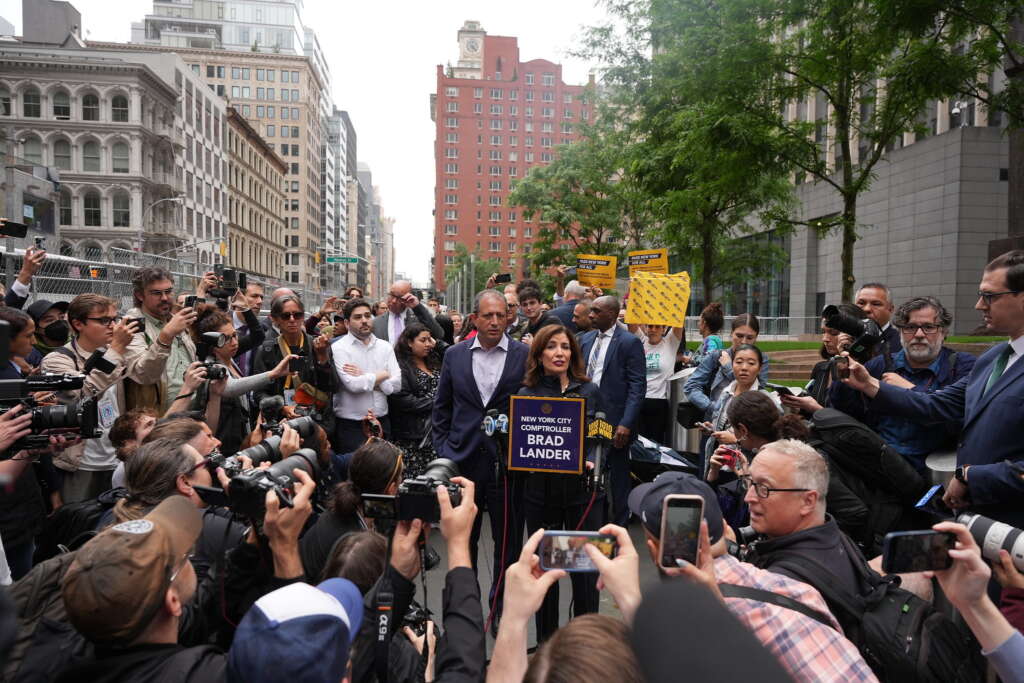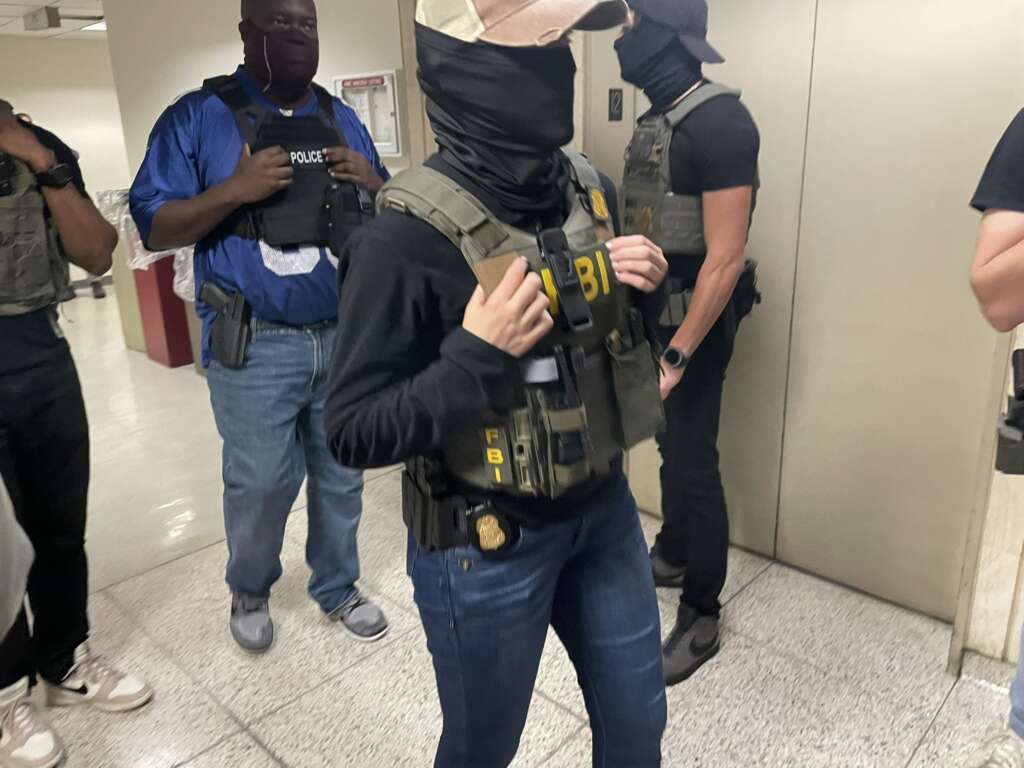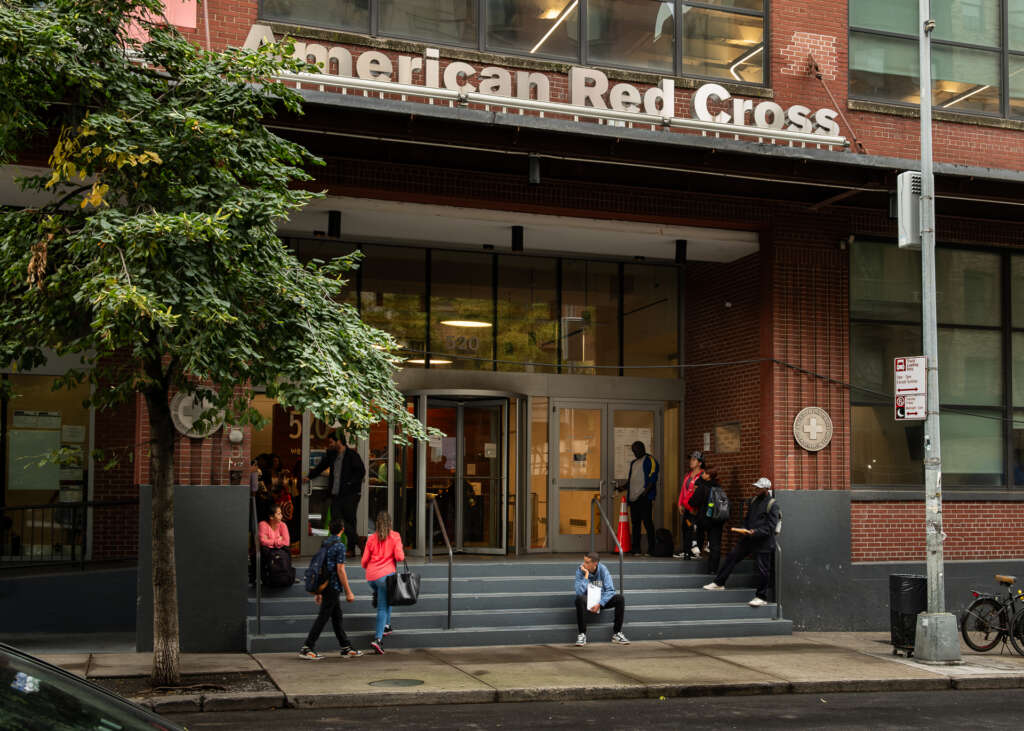As ICE Pursues Courthouse Arrests, Immigrant Families Struggle to Find Legal Help
Family members cope with the hardship of having a loved one detained while facing the challenge of finding an attorney to represent the detained person as the clock ticks down on their deportation.

The woman’s husband was scheduled to appear for a routine, mandatory check-in at the 26 Federal Plaza courthouse at the end of May.
She and her daughter, who asked not to be identified because they feared jeopardizing their ongoing immigration cases, did not accompany him. The woman said her husband, who is from Ecuador, had his first court hearing for an asylum application. The family has been living in the city’s shelter system.
According to his wife, just after the judge dismissed his case, the man was arrested by Immigration and Customs Enforcement (ICE) agents.
His arrest is one of dozens in recent weeks at Manhattan’s three immigration courts, part of ICE’s tactic to carry out mass deportations under the Trump administration by targeting people showing up for their scheduled immigration hearings.
Now, as the woman copes with the hardship of having a loved one detained, she also faces the challenge of finding an attorney to represent her husband while the deportation clock ticks down.
“I feel helpless,” said the detainee’s spouse in Spanish. “He had his Social [Security Number], work permit, with all his papers in order. A man who likes to work, and ICE took him away.”
After inauguration, the Trump administration broadened the scope of an immigration policy known as “expedited removal,” enacting a nationwide expansion (something he’d also attempted during his first term).
Before, this policy only applied to people detained within 100 miles of an international border and to those who had been in the U.S. for less than two weeks. With the expansion, those who can’t prove they have been in the country for more than two years are subject to expedited deportation.
Soon after, the American Civil Liberties Union (ACLU) and Make the Road New York (MRNY) sued the administration over the expansion. While the case remains ongoing in court, ICE is moving forward with arrests. NBC News reported that the the Justice Department instructed immigration judges to quickly dismiss cases, not allowing migrants the typical 10-day response time.
On Tuesday, City Comptroller Brad Lander—who is running in the current Democratic primary for mayor—was handcuffed and temporarily detained by masked ICE agents as he was escorting a man out of an immigration court hearing at 26 Federal Plaza, after the man’s case was dismissed.
That man, named Edgardo, is now in ICE detention, Lander told reporters after his own release.
“As far as I know, he has no lawyer,” the comptroller said, according to video shared online by the news site Hell Gate. “He has been stripped of American due process rights by a government and a judge that owe him a credible fear hearing before they deport him.”
When immigration judges dismiss deportation cases, those people are left without much protection, allowing ICE agents to initiate an expedited removal.
“This isn’t the same as someone who’s on the street and ICE knows nothing about them,” Paige Austin, supervising litigation attorney at Make the Road, explained. “ICE knows all about them. They come to their court date and there’s an advance notice of who has court so ICE has their photo, they have their records, they have their documents from the border.”
However, the policy is difficult to understand for the affected families, who say that they’ve followed the rules since arriving in the country.
“In terms of patterns, many of the individuals that we have seen who have been arrested by [Department of Homeland Security] are contributing members of their community, have been showing up to court hearings and complying with their legal obligations, and often have no criminal record at all,” said Melissa Chua, co-director of the New York Legal Assistance Group’s Immigrant Protection Unit.

Even before Trump took office this year and ramped up enforcement, many immigrants struggled to find or afford legal help (and unlike criminal court cases, representation isn’t guaranteed in immigration court).
Further complicating that access is the fact that after arrest, detainees are often moved to distant states like Texas or Louisiana. This is where the woman whose husband was arrested at the end of May was being held, after a short stay in Texas, when City Limits last heard from her on June 6.
The move makes it more difficult for organizations in New York to take his case, explained the wife, who said she has been going out everyday knocking on the doors of every organization and legal service suggested to her.
“I’ve even talked to private attorneys who tell me they can help me get him out on bail for $3,000,” the man’s wife said, saying she was considering this option, but didn’t have the means to pay for it. When City Limits last spoke to her early in June, she was still looking for representation for her husband, who, she says, has until June 30 to appeal his deportation.
When asked, City Hall did not respond to questions about what guidance or assistance the city is providing to family members of people detained after immigration hearings. A spokesperson for the mayor referred to an amicus brief filed by the city in the case Dylan Lopez Contreras, a high school student arrested in a Manhattan courthouse after attending an immigration hearing.
“The tactics employed in Dylan’s case—using his appearance at court for a routine immigration hearing as an opportunity to detain him—threatens to deter people from accessing the court system on which local governance depends,” the city’s head lawyer, Muriel Goode-Trufant, wrote in the filing.
In recent months, the city has been winding down many of the services it had previously offered to migrants in its care, citing declining numbers of new arrivals (though around 38,000 remained in the shelter system as of last month).
In May, the mayor’s office announced the closure of the Asylum Application Help Center, a destination for migrants to file immigration paperwork and get assistance with their cases. It’s slated to shutter at the end of the month.
The administration also restructured a de Blasio-era program, formerly known as ActionNYC, that funds immigration legal help, phasing out an aspect of the initiative which provided services in city institutions like hospitals, schools and libraries.
“The demand for these resources exceeds the resources available—and that was true before the city announced it was closing these help centers,” said Rosa Santana, co-executive director of the Envision Freedom Fund, an organization that has helped pay bonds of people to get out of detention centers when that option is available.
However, “for most detained immigrants and their families, bond amounts are impossible to afford,” Santana explained, adding that last year the median bond in New York State was $10,000, double the national median.

The City Council is currently pushing for $109 million in the upcoming fiscal year 2026 budget for immigration legal services programs—up from last year’s allocation of $25 million, advocates say. That would include $40 million for the Immigrant Opportunity Initiative, which helps low-income immigrant New Yorkers apply for things like citizenship and permanent residency, as well as $10 million for the Rapid Response program, which aids people facing detention or deportation.
At the state level, Gov. Kathy Hochul’s office said the most recent budget deal, passed in May, included $50 million for immigration legal services. On Wednesday, at least one advocacy group, Vera Institute of Justice, called for the legislature—which just wrapped up its work for 2025 this week—to reconvene for a special session to increase those funds.
“This immigration dragnet is an affront to due process that has ensnared thousands of people who are working, supporting their families, and long-time members of their communities,” Shayna Kessler, director of the organization’s Advancing Universal Representation initiative, said in a statement. “We are alarmed by this escalation.”
Immigration advocates in New York say that they started receiving calls about courthouse arrests and detentions after a heated meeting on May 21 where Stephen Miller, the White House deputy chief of staff, and Kristi Noem, the secretary of the Department of Homeland Security (DHS), urged ICE agents to arrest 3,000 people per day.
Days later, internal documents obtained by the Washington Post showed the federal government was instructing ICE to arrest people at courthouses.
For those with upcoming immigration court hearings, the attorneys consulted for this story said they could not give specific recommendations, as it depends on the specifics of an individual’s case.
People represented by an attorney can request an appearance virtually, suggested Chu, adding that parents worried about arrests can name a standby guardian to take care of their children should they be detained.
Austin added that people in detention can request a “credible fear” interview, a screening process to determine whether someone has a valid fear of persecution or torture if returned to their home country.
Earlier this month, she said MRNY was working on 50 cases involving people who were arrested following an immigration hearing in Manhattan; 35 were still detained at the time, while some had already been deported.
“You can only imagine that that’s probably a small fraction,” Austin said. “We’re getting, at this point, inundated with phone calls from people with future hearing dates, who are very scared.”
To reach the reporter behind this story, contact Daniel@citylimits.org. To reach the editor, contact Jeanmarie@citylimits.org
Want to republish this story? Find City Limits’ reprint policy here.
The post As ICE Pursues Courthouse Arrests, Immigrant Families Struggle to Find Legal Help appeared first on City Limits.



